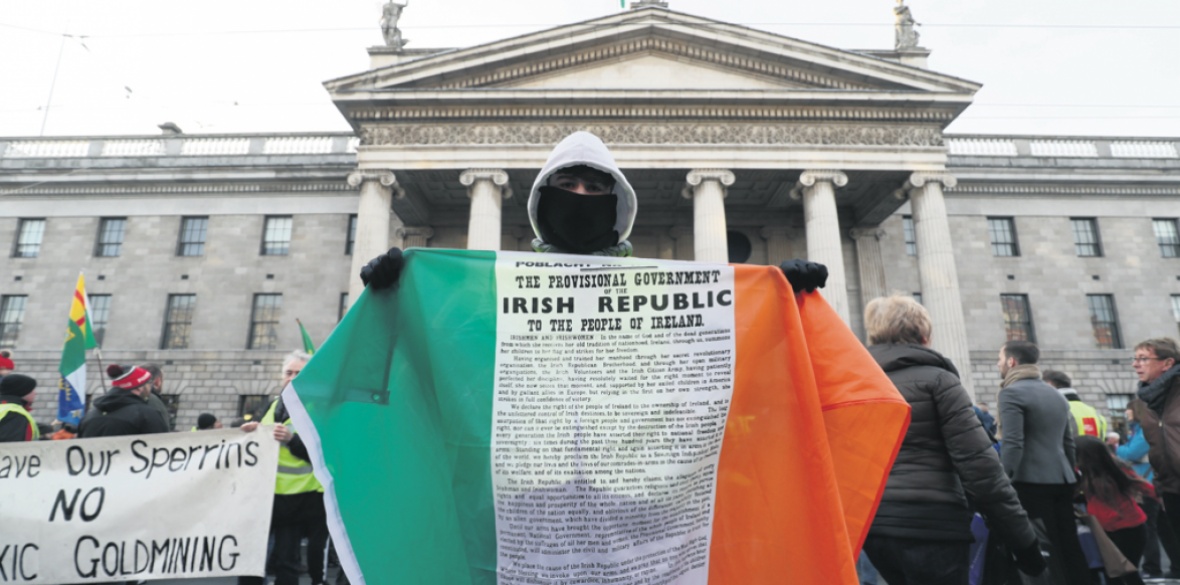This is the last article you can read this month
You can read more article this month
You can read more articles this month
Sorry your limit is up for this month
Reset on:
Please help support the Morning Star by subscribing here
TODAY many take a dim view on the capacity of the Irish people to reconquer Ireland from its captors.
Meek, unable, timid — these are all terms that often are said by activists as a painful criticisms of both themselves and of each other. “Where is our fighting spirit gone?” comes the question, time and time again.
But one should not look at the years between 1922-2018 as some sort of conclusive study on the timidity or obedience of the Irish people.
A very quick study examining the period leading to the rebellion of 1798, 1803, 1848 and the Land Wars of the 1870s, a decline through the 1880s, finally followed by the revival of militant Republicanism in the 1910s, the Rising of 1916 and finally the War of Independence in 1922 would suggest a different characterisation – that the last 96 years were simply another periodic downturn in the history of rebellion on this island.
There is a point to be made here and a distinction added. A war in the North took place for the national liberation of Ireland but as time went on it became diluted and confined, dislocated from the social question in Ireland and focused on a military war of attrition with the British state. This is uniquely distinct to social struggles, surrounding questions of land, food or housing and the events in Roscommon are reflective of that.
The people of Ireland are entrapped in the shackles of a liberal democracy which delivers just enough breadcrumbs to keep our tradition of armed rebellion and resistance at bay, just as in previous historic periods with strategic concessions by the British state, the Church or by the landed gentry.
At the moment of writing this article, there are 29,000 homes in arrears in Ireland according to the Central Bank. Estimates suggest that half of these homes are going to be repossessed. 17 per cent of all of the homes in arrears are owned by vulture funds that as we have seen have little to no issue with driving people out of their houses or off their land.
If we’re to accept that the conditions in Ireland are dialectically linked to the level of resistance offered by the population, then one can begin to see that the trend of meek, passive and civil resistance is unravelling and perhaps coming to an end.
Roscommon, a midland county on the periphery with the British border.
The events in Roscommon mirror thousands of other cases, where homeowners have offered to pay what they can but have been rebuffed by the mortgage holder.
In the case of the house in Roscommon, Stokestown, the family of siblings offered to pay €1,000 (£900) per month, yet KBC Bank had different ambitions for the house.
KBC Bank, either via the Sheriff in the area or on its own initiative, proceeded to hire private security workers from the North of Ireland, many of who were later exposed to be former Loyalist paramilitaries, to enforce the eviction.
Footage captured the private security beating one of the elderly homeowners while the police looked on. The video spread rapidly across the island.
It’s worth noting that this was not the first time a KBC Bank repossession has used security contractors to enforce an eviction. The last one was in Dunmanway in West Cork where a family of two children and two adults left their home for the day and returned to find it fenced off and surrounded by an army of contractors with attack dogs – although this did not develop into an incident, anger at these brazen tactics began to build.
The Stokestown eviction footage came a few days before a “yellow jackets” protest, inspired by the French gilets jaunes movement, happened in Dublin. On the march the door of a KBC bank was kicked – which may seem minor but is a marked change to how protests have generally gone in recent history. Something was up.
Later that night on December 22 an organised group of people, armed with baseball bats, physically evicted the security operators occupying the Stokestown house, hospitalising three and forcing the other four to flee on foot. An attack dog was set on the activists and was fatally injured, the only part of the battle that has actually evoked any rebuke. Before the activists left, all security vehicles were torched.
The public sympathy and support for the action was overwhelming. Despite the condemnation and slander in Ireland’s famously backward press, social media was flooded with accolades for the masked men and their actions.
As the halls of the Dail Eireann rang with condemnation and rants about dissident republicans, criminal gangs and other spectres haunting Ireland, KBC Banks in three locations were subject to arson attacks in Dublin in the following nights.
A financial institution, believing correctly that the state would protect and defend its interests, had overreached and targeted a community and a society that has has begun to drift away from civil and passive resistance.
As the bolts of capitalism tighten on Ireland people are becoming rapidly poorer: increasing costs of living, some of the most eye-watering rents in the world, and stagnating wages put to bed the lie of the Celtic Tiger, a boom bought on borrowed money and the short-term thinking of neoliberal economics, and the lie that Ireland’s revolution finished 100 years ago. We fought heroically for a life of dignity and self reliance – and we’ve not been given one
The history of Ireland shows that what constitutes as necessary resistance will rise in line with our oppression. When it was time to riot, rebel and organise militias, contrary to our conservative reputation, there was no hesitation to do so. I would be willing to say that we are on the precipice of a similar trend.
Minor legislation relating to repossessions and evictions may act as some form of appeasement for some homeowners, but means nothing to those born in the 1990s who have no chance of owning their own home. They do however have every chance of not being able to make the rent – leading to the exact same circumstances that led to Roscommon.
Rather than baulk in fear or desperately search of a more palatable way of “addressing the issues,” the Roscommon action is a threshold we on the left should aspire to cross. Only a furious, organised and militant working class can conclusively end the tyranny of capital. We see that fury rising in Ireland today.
Alexander Homits is general secretary of the Connolly Youth Movement.












